Morocco is home to a diverse mix of ethnic groups, including Arabs, Berbers, and Sahrawi people. Each group brings its own unique flavor to the nation’s rich cultural tapestry. You’ll notice this diversity in the languages spoken here. Arabic and Berber are the main languages, but you’ll also hear a lot of French and, more and more, English. Knowing a few phrases in these languages can make your travels smoother and more enjoyable.
Religion plays a big role in Moroccan life. Most people practice Sunni Islam, which influences their daily routines and social customs. When visiting, you’ll see how religion shapes everything from the way people dress to the way they greet each other.
One of the most charming aspects of Moroccan culture is their legendary hospitality. Moroccans love to welcome guests, and communal dining is a big part of this. Don’t be surprised if you’re invited to share a meal; it’s a sign of their warmth and generosity. Plus, the food is delicious—you might find yourself unable to resist another serving of tagine or couscous!
So, what else makes Morocco’s people so interesting? For starters, their traditions are a colorful mix of history and modern life. You might see a bustling market where traditional crafts are sold right next to a shop offering the latest smartphones. This blend of old and new is part of what makes traveling in Morocco so fascinating.
Ready to dive into this amazing culture? Pack your bags and get ready to experience the incredible hospitality and vibrant traditions of Morocco’s people!
Exploring Morocco’s Ethnic Diversity
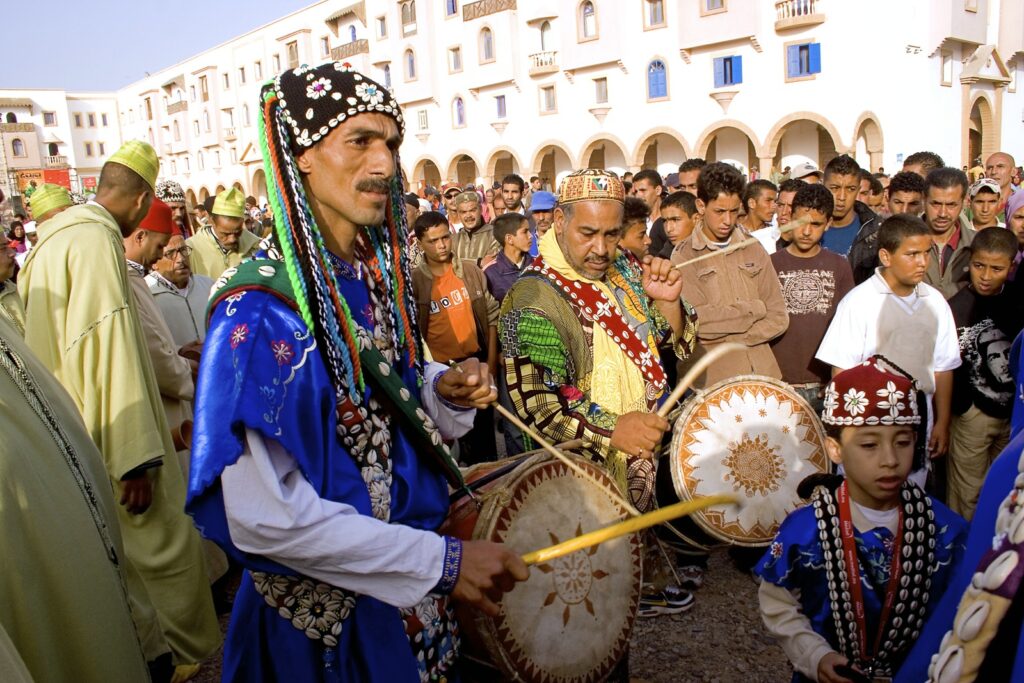
Travelers heading to Morocco will find a vibrant mix of cultures and traditions due to its rich ethnic diversity. The country is like a colorful tapestry, mainly featuring Arabs and Berbers, with a smaller Sahrawi minority adding to the blend. This mix comes from centuries of people moving, conquering, and settling in Morocco, shaping its unique identity.
Arabs make up about 67% of Morocco’s population. Their influence dates back to the 7th century when Muslim conquests brought Arab culture and Islamic traditions. You’ll see this influence in the language, food, and festivals. On the other hand, the Berbers, also known as the Amazigh, have been in Morocco for over 5,000 years and make up around 31% of the population. They are the original inhabitants and have added their own rich customs and languages to the Moroccan culture.
As you travel through Morocco, you’ll notice different Berber dialects spoken in various regions. This adds to the country’s linguistic diversity, as these dialects exist alongside Darija, the Moroccan dialect of Arabic. Although Arabic is widely spoken, Berber languages are also officially recognized, showing the nation’s dedication to preserving its heritage.
The Sahrawi people, although a smaller group, further enrich Morocco’s ethnic landscape. Their presence, along with the Arabs and Berbers, makes Morocco a fascinating place to explore. This diverse mix of people not only tells the story of Morocco’s past but also makes the country an exciting and culturally rich destination today.
Language and Communication
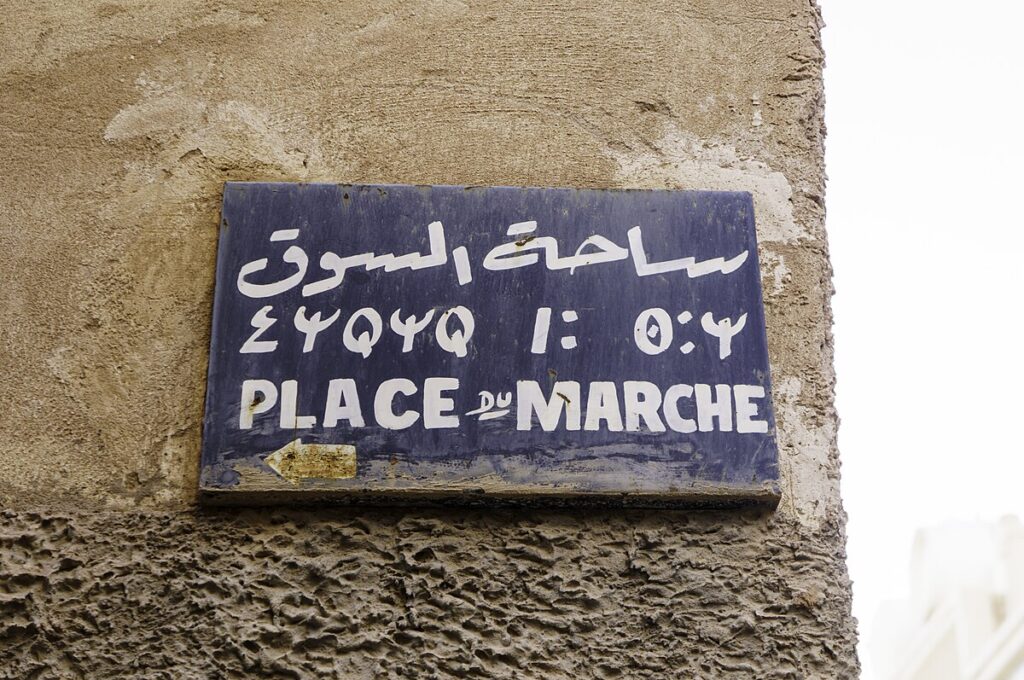
Traveling to Morocco is like stepping into a world where languages come alive! You’ll hear a mix of Arabic, Berber, and French as you explore this beautiful country. Don’t worry, though—we’ve got you covered with all the info you need to navigate Morocco’s fascinating linguistic landscape.
First off, Arabic is a big deal here. Morocco has two kinds of Arabic: Modern Standard Arabic, which you’ll see in official settings like government buildings, and Darija, the local dialect that people use in everyday conversations. So, if someone greets you with “Salam,” they’re speaking Darija, and it just means “Hello!”
Next up, we have Berber, or Amazigh, languages. These include Tashelhit, Tamazight, and Tarifit. About 8.8 million Moroccans speak these languages, so you might hear them, especially in rural areas. It’s part of the country’s rich cultural heritage, and Morocco even made Berber an official language along with Arabic. Cool, right?
Now, let’s talk about French. Thanks to Morocco’s history, French is widely used in business, schools, and big cities. So if you’re shopping in Casablanca or dining in a fancy restaurant in Rabat, you’ll probably hear a lot of French. It’s like the bridge that connects Morocco to the rest of the world.
And what about English? Well, it’s not as common as French, but it’s catching on, especially in tourist spots. So, you’ll likely find English speakers in places like Marrakech or Fez, which is great news for travelers!
In short, Morocco’s language mix makes for an exciting travel experience. Whether you’re chatting with locals in a bustling market or navigating the streets of a historic medina, you’ll encounter a blend of Arabic, Berber, and French that adds to the country’s unique charm. So, pack your bags, brush up on a few phrases, and get ready to dive into Morocco’s vibrant linguistic landscape!
Cultural Etiquette
Understanding cultural etiquette in Morocco is crucial if you want to have great interactions with locals during your trip. When greeting someone in Morocco, it’s common to say “Salaam Alykum,” which means “peace be upon you.” This greeting is both formal and friendly. Physical contact between men and women who aren’t related is usually avoided. So, no hugs or handshakes with the opposite sex unless you’re family!
When it comes to dressing, modesty is key. Men should wear long pants and shirts, while women should cover their arms, knees, and chest. If you’re visiting a mosque, women will also need to cover their hair.
Moroccan hospitality is legendary. Guests are often welcomed with a cup of sweet mint tea. Before you get your tea, expect some friendly chat; it’s considered polite to engage in conversation. When it’s time to eat, remember to wash your hands, wait for the host to say “bismillah” (which means “in the name of God”) before you start eating, and always use your right hand for food. The left hand is considered unclean, so keep it out of your dining experience.
If you love taking photos, be careful. Always ask for permission before snapping pictures of people to avoid any misunderstandings. And remember, photographing military or police personnel is a big no-no and illegal.
Following these simple cultural etiquette tips will show respect and help you enjoy a richer experience in Morocco. So, pack your bags, brush up on your “Salaam Alykum,” and get ready for an amazing adventure!
Religion and Practices in Morocco for Travelers
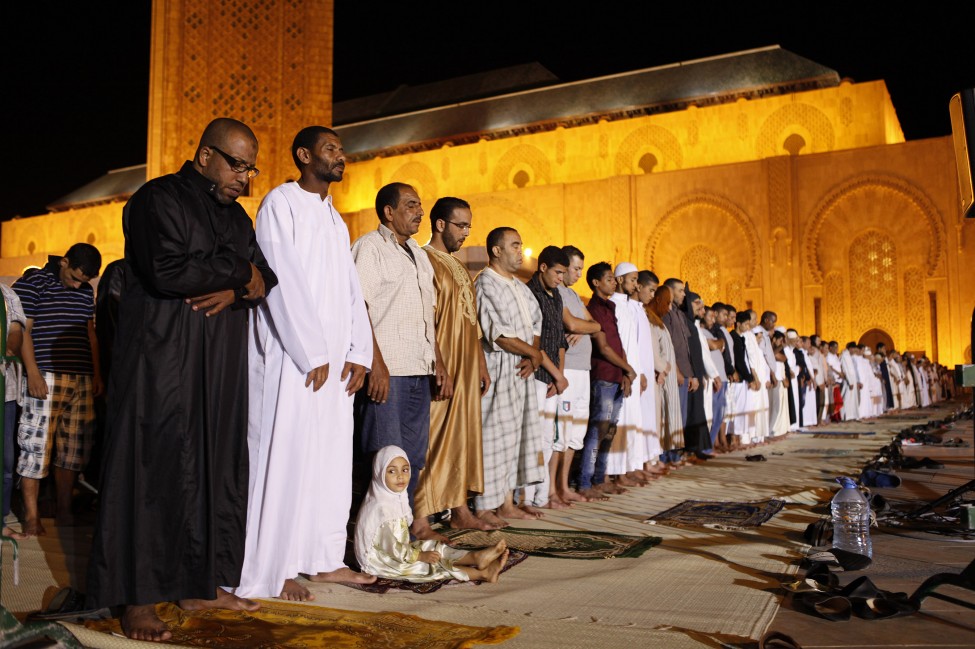
If you’re planning a trip to Morocco, it’s important to understand how religion shapes everyday life there. About 99% of Moroccans follow Sunni Islam, which influences many aspects of their culture. You’ll notice this right away with the call to prayer, which happens five times a day. It’s a beautiful sound that echoes through towns and cities, reminding everyone of their shared faith and giving you a glimpse into local life.
In Morocco, modesty is key. You’ll want to dress conservatively, covering your shoulders and knees, especially when visiting rural areas or during religious events. This shows respect for the local customs and helps you fit in better with the community. Plus, you’ll stay cooler in the long, sunny days!
One of the most important times in Morocco is Ramadan, the holy month of fasting. During this month, Muslims fast from dawn until sunset. That means no eating or drinking in public during the day. It’s a good idea to join in the spirit of the month by being discreet with your snacks and drinks. It’s also a chance to experience the special Ramadan meals that happen after sunset, which are delicious and a big part of Moroccan culture.
Alcohol isn’t widely consumed in Morocco, and pork is off the menu due to Islamic dietary rules. You’ll find plenty of tasty alternatives, though, like tagines, couscous, and fresh fruit juices. Enjoy exploring the local cuisine while respecting these dietary practices.
Moroccan Social Customs and Hospitality: A Traveler’s Guide
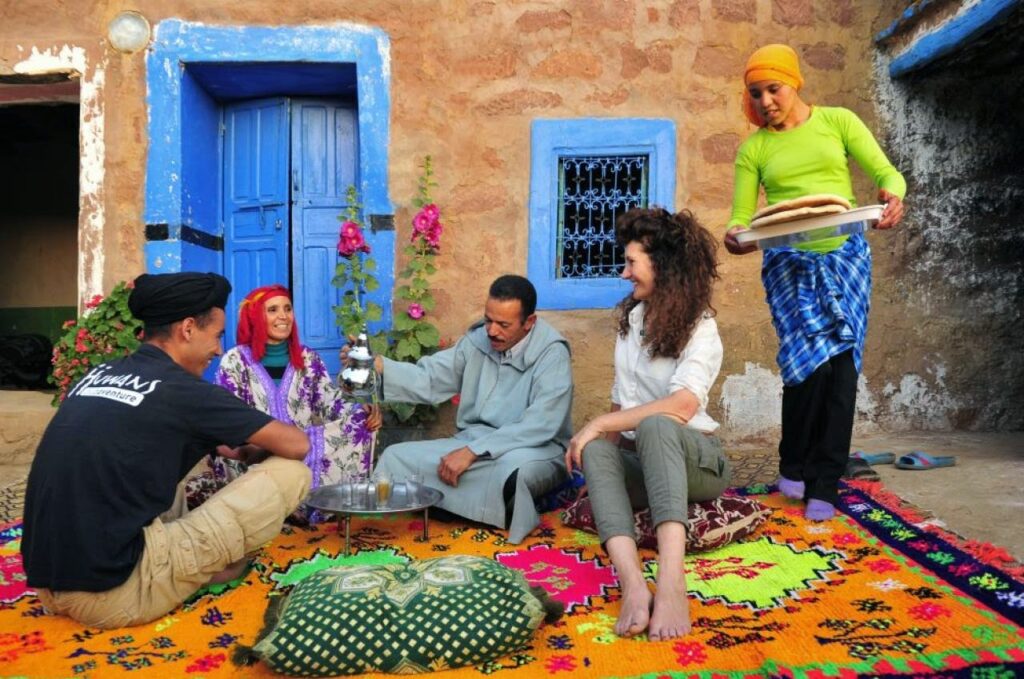
Moroccan social customs and hospitality are very important in Morocco. They’re rooted in traditions and religious practices and shape how people interact every day. If you’re planning a trip to Morocco, here’s what you need to know about Moroccan hospitality.
First, the famous Moroccan hospitality. When you visit someone’s home, they will often greet you with a cup of sweet mint tea. This isn’t just any tea; it’s a special way to show respect and kindness. So, sip that tea and feel welcomed!
Basic Etiquette Rules
- Shoes Off: Before you step into a Moroccan home, take off your shoes. It’s a sign of respect and keeps the house clean.
- Small Gifts: When visiting, it’s nice to bring a small gift. Pastries or tea are great choices. Think of it as a little “thank you” for their hospitality.
- Chat First: Before diving into serious topics, have a casual chat with your host. This helps build a friendly connection.
Communal Dining
Eating together is a big deal in Morocco. Meals often start with the host saying ‘Bismillah,’ which means “in the name of God.” Then, everyone shares food from a big, common dish using their right hand. This way of eating shows unity and community.
Key Points to Remember
- Warm Welcomes: Expect to be greeted with sweet mint tea.
- Etiquette Rules: Take off your shoes and bring a small gift.
- Communal Dining: Share food from a common dish to bond with others.
Understanding Moroccan hospitality will make your trip more enjoyable and help you connect with the locals. So, follow these tips, enjoy the warm welcomes, and maybe even learn to love sweet mint tea!

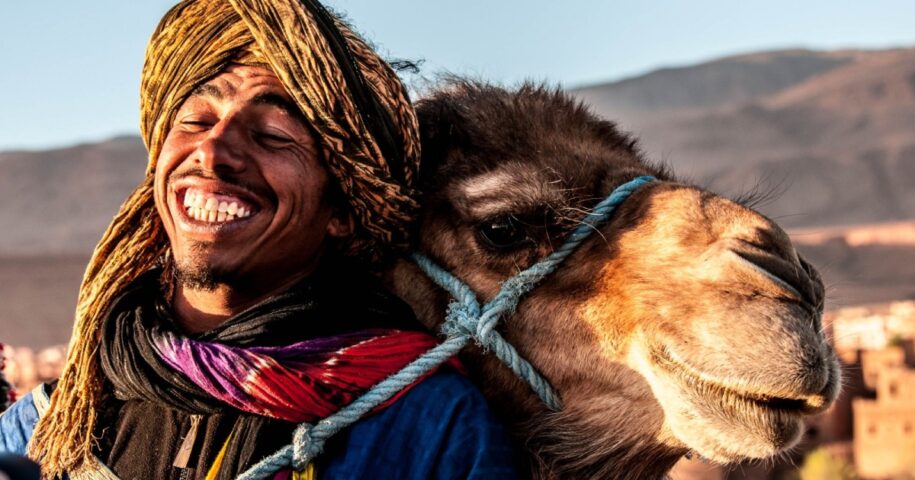
Leave a Reply